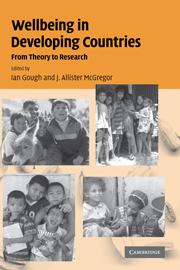Book contents
- Frontmatter
- Contents
- Figures
- Tables
- Notes on contributors
- Acronyms
- Preface
- Introduction
- 1 Theorising wellbeing in international development
- Part I Human needs and human wellbeing
- 2 Conceptualising human needs and wellbeing
- 3 Basic psychological needs: a self-determination theory perspective on the promotion of wellness across development and cultures
- 4 Measuring freedoms alongside wellbeing
- 5 Using security to indicate wellbeing
- 6 Towards a measure of non-economic wellbeing achievement
- Part II Resources, agency and meaning
- Part III Quality of life and subjective wellbeing
- Conclusion: researching wellbeing
- References
- Index
4 - Measuring freedoms alongside wellbeing
Published online by Cambridge University Press: 22 September 2009
- Frontmatter
- Contents
- Figures
- Tables
- Notes on contributors
- Acronyms
- Preface
- Introduction
- 1 Theorising wellbeing in international development
- Part I Human needs and human wellbeing
- 2 Conceptualising human needs and wellbeing
- 3 Basic psychological needs: a self-determination theory perspective on the promotion of wellness across development and cultures
- 4 Measuring freedoms alongside wellbeing
- 5 Using security to indicate wellbeing
- 6 Towards a measure of non-economic wellbeing achievement
- Part II Resources, agency and meaning
- Part III Quality of life and subjective wellbeing
- Conclusion: researching wellbeing
- References
- Index
Summary
Introduction
A new idea, it would seem, more easily moves into significance if it drives up with a novel methodological sidecar attached. So the idea of human capital arose together with the methodology that human capital variables should be on the right-hand side of growth equations. The idea of human development arose together with the methodological tool of the Human Development Index (HDI). And of course the idea of free trade drove up with methodologies of privatisation and liberalisation. While the relationship between the idea and the method is often publicly uneasy (usually because the methodology does not precisely match or compass the idea), the fact that such pairings are both common and fruitful can hardly pass notice. It follows that if potentially interesting ideas roar in without appropriate sidecars in tow, the research community sets about to craft them.
When such a community considers Sen's capability approach as a way of framing wellbeing and agency, they will immediately observe that the methodological sidecar seems unfinished. Even if one focuses purely on the issue of measuring the expansion or contraction of basic capabilities at the individual level, Sen's conceptual approach seems far richer and more compelling than the measurement companions thus crafted – and of course measurement is only one intermediary methodology that might be of use. In particular, existing measures focus on functionings – beings and doings such as being nourished or education – but neglect freedoms.
- Type
- Chapter
- Information
- Wellbeing in Developing CountriesFrom Theory to Research, pp. 93 - 108Publisher: Cambridge University PressPrint publication year: 2007
- 3
- Cited by



